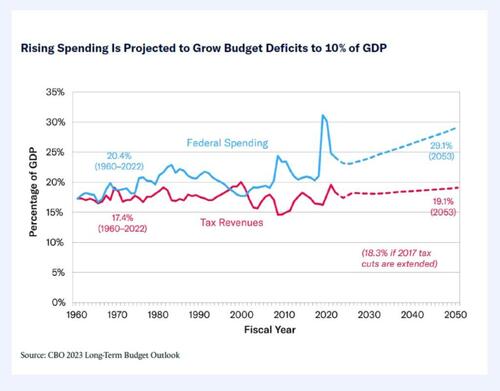First, our income taxes are already the most progressive in the OECD, and by increasing the income tax rate, we also increase the incentive to avoid paying it, so it would not raise tax revenue by very much.
America’s top tax rates often exceed international norms. Our top income-tax bracket of 43.7%—including typical state taxes—exceeds that of the standard OECD nation (40.4%). Our top capital-gains tax rate is 10 points above the OECD average, and our corporate tax rate exceeds not only the OECD mean but that of every Scandinavian nation. America’s effective corporate tax rate is also above average, as are its estate and inheritance taxes.Second, as we know from Chapter 2, taxes destroy wealth by discouraging wealth-creating transactions, so if we tax income, we get less of it. This also reduces the amount of money that an income tax would raise.
So, what should we do?
First, get our spending in line with our income. In the graph below, we see that are spending 8% more than we are making.
Failing that, we can raise more money with a low rate, broad-based consumption tax, like a VAT.
Politically, we could probably "sell" a consumption tax if we also promised to reduce income tax. But this would be opposed by the left because consumption taxes are not as progressive as income taxes. Likewise, those on the right would be skeptical because consumption taxes are so good at raising money that they have been used by EU countries to expand the scope of government. As the late PJ O'Rourke wrote, "Giving money and power to government is like giving whiskey and car keys to teenage boys."

No comments:
Post a Comment